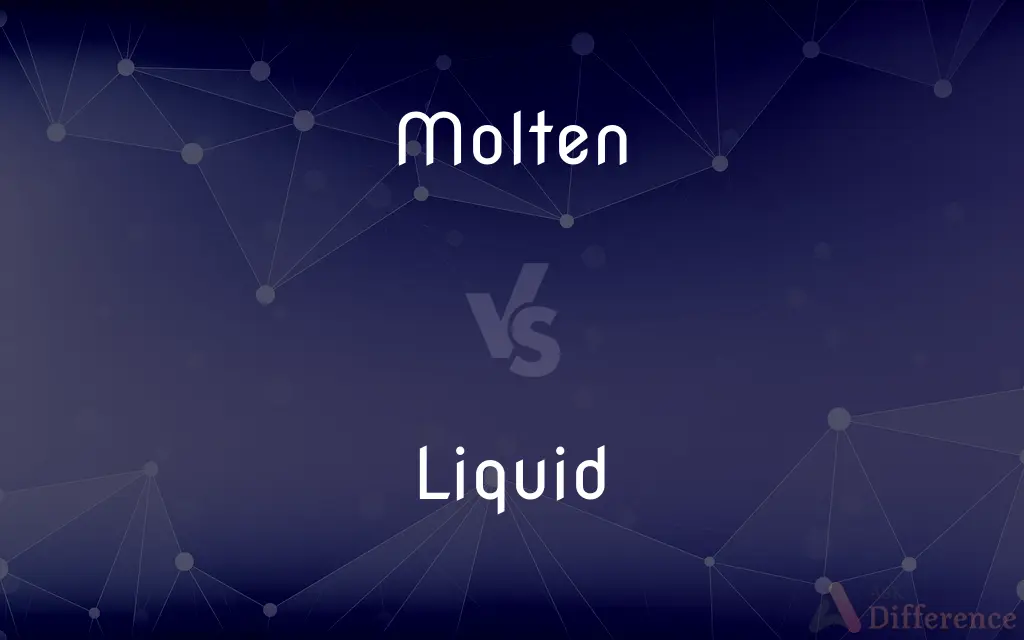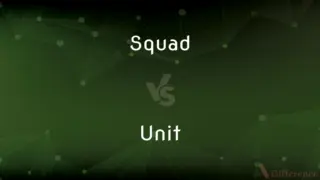Molten vs. Liquid — What's the Difference?
Edited by Tayyaba Rehman — By Maham Liaqat — Updated on May 13, 2024
Molten specifically refers to substances liquefied by heat, like molten lava, whereas liquids encompass a broader state of matter at ambient conditions.

Difference Between Molten and Liquid
Table of Contents
ADVERTISEMENT
Key Differences
Molten substances are defined by their transformation from solid to liquid due to high temperatures. Whereas, liquids are characterized by their ability to flow and take the shape of their container under a range of temperatures, not necessarily high.
Molten materials often involve metals or geological formations. On the other hand, liquids can include a vast array of substances such as water, oil, and alcohol, regardless of their source or composition.
The term "molten" is typically associated with substances that are normally solid at room temperature. Whereas liquids might never solidify under normal environmental conditions.
Handling molten substances usually requires special safety precautions due to their high temperatures and potential hazards. In contrast, liquids vary widely in their safety requirements based on their chemical properties.
In industries, molten materials are crucial for processes like casting and forging. On the other hand, liquids are used more broadly in applications ranging from cooling to solvent systems.
ADVERTISEMENT
Molten substances cool down to become solid, often forming specific crystalline or glassy structures. Liquids, however, might just change temperature or mix with other liquids without undergoing a phase change.
Comparison Chart
Definition
Substances made liquid by heat.
A state of matter that flows freely.
Temperature
High, above the melting point.
Variable, generally at ambient.
Common Substances
Metals, glass, lava.
Water, oil, alcohol.
Safety Precautions
High due to extreme heat.
Depends on chemical properties.
Phase Change
Solid to liquid by heating.
May not involve a phase change.
Compare with Definitions
Molten
Requiring high temperatures to liquefy.
The kiln was hot enough to keep the ceramic materials molten.
Liquid
A liquid is a nearly incompressible fluid that conforms to the shape of its container but retains a (nearly) constant volume independent of pressure. As such, it is one of the four fundamental states of matter (the others being solid, gas, and plasma), and is the only state with a definite volume but no fixed shape.
Molten
Made soft or liquid by heat.
The molten glass shimmered in the light.
Liquid
The state of matter in which a substance exhibits a characteristic readiness to flow and little or no tendency to disperse, and is amorphous but has a fixed volume and is difficult to compress.
Molten
Resulting from melting.
The sculpture was created by pouring molten bronze into a mold.
Liquid
Matter or a specific body of matter in this state.
Molten
Made liquid by heat; melted
Molten lead.
Liquid
(Linguistics) A consonant articulated without friction and capable of being prolonged like a vowel, such as English l and r.
Molten
Made by melting and casting in a mold.
Liquid
Of or being a liquid.
Molten
Brilliantly glowing, from or as if from intense heat
"A huge red bed of coals blazed and quivered with molten fury" (Richard Wright).
Liquid
Melted by heating
Liquid wax.
Molten
A past participle of melt.
Liquid
Condensed by cooling
Liquid oxygen.
Molten
Melted.
Molten metal
Molten wax
Molten rock
Liquid
Flowing readily; fluid
Added milk to make the batter more liquid.
Molten
Made from a melted substance. en
Liquid
Having a flowing quality without harshness or abrupt breaks
Liquid prose.
The liquid movements of a ballet dancer.
Molten
Glowing red-hot.
Liquid
(Linguistics) Articulated without friction and capable of being prolonged like a vowel.
Molten
(archaic) melt
Liquid
Clear and shining
The liquid brown eyes of a spaniel.
Molten
Melted; being in a state of fusion, esp. when the liquid state is produced by a high degree of heat; as, molten iron.
Liquid
Existing as or readily convertible into cash
Liquid assets.
Molten
Made by melting and casting the substance or metal of which the thing is formed; as, a molten image.
Liquid
A substance that is flowing, and keeping no shape, such as water; a substance of which the molecules, while not tending to separate from one another like those of a gas, readily change their relative position, and which therefore retains no definite shape, except that determined by the containing receptacle; an inelastic fluid.
A liquid can freeze to become a solid or evaporate into a gas.
Molten
Reduced to liquid form by heating;
A mass of molten rock
Liquid
(phonetics) Any of a class of consonant sounds that includes l and r.
Molten
Turned into liquid by heat.
The forge was full of molten iron ready for casting.
Liquid
Flowing freely like water; fluid; not solid and not gaseous; composed of particles that move freely among each other on the slightest pressure.
Liquid nitrogen
Molten
The liquid form of a substance typically solid at room temperature.
Molten lava flowed down the volcano’s side.
Liquid
Easily sold or disposed of without losing value.
Liquid
Having sufficient trading activity to make buying or selling easy.
Liquid
Flowing or sounding smoothly or without abrupt transitions or harsh tones.
A liquid melody
Liquid
(phonology) Belonging to a class of consonants comprised of the laterals and the rhotics, which in many languages behave similarly.
Liquid
Fluid and transparent.
The liquid air
Liquid
Flowing freely like water; fluid; not solid.
Yea, though he go upon the plane and liquid water which will receive no step.
Liquid
Being in such a state that the component molecules move freely among themselves, but have a definite volume changing only slightly with changes of pressure, and do not tend to separate from each other as the particles of gases and vapors do when the volume of the container is increased; neither solid nor gaseous; as, liquid mercury, in distinction from mercury solidified or in a state of vapor.
Liquid
Flowing or sounding smoothly or without abrupt transitions or harsh tones.
Liquid
Pronounced without any jar or harshness; smooth; as, l and r are liquid letters.
Liquid
Fluid and transparent; as, the liquid air.
Liquid
Clear; definite in terms or amount.
Liquid
In cash or readily convertible into cash without loss of principle; - said of assets, such as bank accounts, or short-term bonds tradable on a major stock exchange.
Liquid
A substance whose parts change their relative position on the slightest pressure, and therefore retain no definite form; any substance in the state of liquidity; a fluid that is not gaseous and has a definite volume independent, of the container in which it is held. Liquids have a fixed volume at any given pressure, but their shape is determined by the container in which it is contained. Liquids, in contrast to gases, cannot expand indefinitely to fill an expanding container, and are only slightly compressible by application of pressure.
Liquid
A letter which has a smooth, flowing sound, or which flows smoothly after a mute; as, l and r, in bla, bra. M and n also are called liquids.
Liquid
A substance that is liquid at room temperature and pressure
Liquid
The state in which a substance exhibits a characteristic readiness to flow with little or no tendency to disperse and relatively high incompressibility
Liquid
A substance in the fluid state of matter having no fixed shape but a fixed volume
Liquid
A frictionless non-nasal continuant (especially `l' and `r')
Liquid
Existing as or having characteristics of a liquid; especially tending to flow;
Water and milk and blood are liquid substances
Ice is water in the solid state
Liquid
Filled or brimming with tears;
Swimming eyes
Watery eyes
Sorrow made the eyes of many grow liquid
Liquid
Clear and bright;
The liquid air of a spring morning
Eyes shining with a liquid luster
Limpid blue eyes
Liquid
Changed from a solid to a liquid state;
Rivers filled to overflowing by melted snow
Liquid
Smooth and flowing in quality; entirely free of harshness;
The liquid song of a robin
Liquid
Yielding; lacking any hint of hardness;
The liquid stillness of the night enveloping him
The liquid brown eyes of a spaniel
Liquid
Smooth and unconstrained in movement;
A long, smooth stride
The fluid motion of a cat
The liquid grace of a ballerina
Liquid prose
Liquid
In cash or easily convertible to cash;
Liquid (or fluid) assets
Liquid
A freely flowing substance at ambient temperatures.
Water is the most common liquid.
Liquid
A state of matter with no fixed shape but a fixed volume.
Mercury is a metal that exists as a liquid at room temperature.
Liquid
Capable of being poured.
He carefully poured the liquid solution into a beaker.
Liquid
A substance that is wet or fluid.
The liquid detergent easily mixed with water.
Liquid
Existing in a fluid state.
The company was looking for a liquid asset to quickly sell off.
Common Curiosities
Is ice considered a liquid?
No, ice is the solid form of water; it becomes a liquid when it melts.
Can molten substances be found naturally?
Yes, natural occurrences of molten materials include volcanic lava.
What defines a substance as molten?
A substance is considered molten if it becomes liquid as a result of high heat.
Are all liquids at room temperature?
No, while many liquids are at room temperature, such as water, others like liquid nitrogen are cold.
Can liquids freeze?
Yes, most liquids can freeze if the temperature drops below their freezing point.
What industries use molten materials?
Industries such as metal forging, glassmaking, and ceramics extensively use molten materials.
What are common examples of liquids?
Water, oils, and various chemical solvents are examples of liquids.
What is required to handle molten substances safely?
Protective gear and strict safety protocols are essential due to the high temperatures.
Do all liquids flow the same way?
No, viscosity varies greatly among liquids, affecting how they flow.
What are examples of hazardous liquids?
Acids, flammable liquids like gasoline, and toxic solutions are considered hazardous.
How do molten materials differ from solids?
Molten materials are heated solids that have turned to liquid, whereas solids retain their shape.
Can gases be molten?
No, gases cannot be molten; molten refers only to the liquid state from a solid.
What happens when molten substances cool down?
They typically solidify, often into a crystalline or glassy structure.
How are molten metals used in manufacturing?
Molten metals are often used in casting and molding processes in manufacturing industries.
Are molten substances always hotter than liquids?
Typically, yes, as molten states are achieved through significant heating.
Share Your Discovery

Previous Comparison
Squad vs. Unit
Next Comparison
Monoecious vs. DioeciousAuthor Spotlight
Written by
Maham LiaqatEdited by
Tayyaba RehmanTayyaba Rehman is a distinguished writer, currently serving as a primary contributor to askdifference.com. As a researcher in semantics and etymology, Tayyaba's passion for the complexity of languages and their distinctions has found a perfect home on the platform. Tayyaba delves into the intricacies of language, distinguishing between commonly confused words and phrases, thereby providing clarity for readers worldwide.
















































